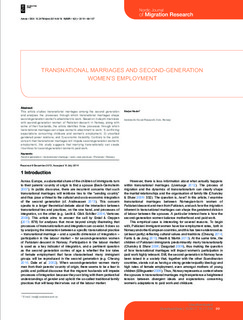| dc.contributor.author | Nadim, Marjan | |
| dc.date.accessioned | 2017-10-31T11:42:44Z | |
| dc.date.available | 2017-10-31T11:42:44Z | |
| dc.date.created | 2014-09-26T09:47:00Z | |
| dc.date.issued | 2014 | |
| dc.identifier.citation | Nordic Journal of Migration Research. 2014, 4 (3), 99-107. | |
| dc.identifier.issn | 1799-649X | |
| dc.identifier.uri | http://hdl.handle.net/11250/2463158 | |
| dc.description.abstract | This article studies transnational marriages among the second generation and analyses the processes through which transnational marriages shape second-generation women’s attachment to work. Based on in-depth interviews with second-generation women of Pakistani descent in Norway, along with some of their husbands, the article identifies three processes through which transnational marriages can shape women’s attachment to work: 1) conflicting expectations concerning childcare and women’s employment; 2) unsettled gendered power relations; and 3) economic instability. Contrary to the public concern that transnational marriages will impede second-generation women’s employment, this study suggests that marrying transnationally can create incentives for second-generation women’s paid work. | |
| dc.language.iso | eng | |
| dc.relation.uri | www.degruyter.com/dg/viewarticle.fullcontentlink:pdfeventlink/$002fj$002fnjmr.2014.4.issue-3$002fnjmr-2014-0019$002fnjmr-2014-0019.pdf?format=INT&t:ac=j$002fnjmr.2014.4.issue-3$002fnjmr-2014-0019$002f | |
| dc.title | Transnational marriages and second-generation women's employment | |
| dc.type | Peer reviewed | |
| dc.type | Journal article | |
| dc.description.version | publishedVersion | |
| dc.source.pagenumber | 99-107 | |
| dc.source.volume | 4 | |
| dc.source.journal | Nordic Journal of Migration Research | |
| dc.source.issue | 3 | |
| dc.identifier.doi | 10.2478/njmr-2014-0019 | |
| dc.identifier.cristin | 1158348 | |
| dc.relation.project | Norges forskningsråd: 194379 | |
| cristin.unitcode | 7437,0,0,0 | |
| cristin.unitname | Institutt for samfunnsforskning | |
| cristin.ispublished | true | |
| cristin.fulltext | original | |
| cristin.qualitycode | 1 | |
